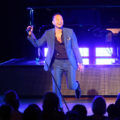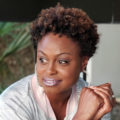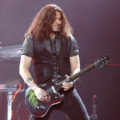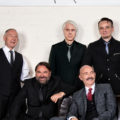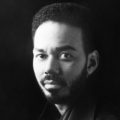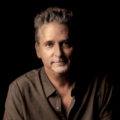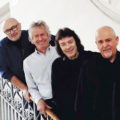“Becoming Human”: Simon Collins, a labyrinth of sounds and a famous musical father
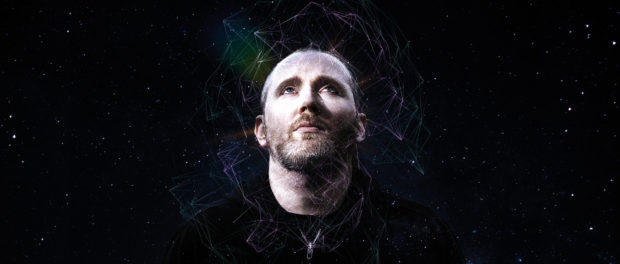 Photo provided by Norman McCloskey
Photo provided by Norman McCloskey
Throughout each of his electronically-focused solo albums, then one with progressive and alternative rock experimenters Sound Of Contact, Simon Collins keeps evolving with an intricate labyrinth of sounds.
That’s all the more apparent throughout his Frontiers Records debut, “Becoming Human,” which also reaches deep into the corners of his soul and consciousness after a wave of serious setbacks.
The singer/songwriter/drummer (who just so happens to be the son of Phil Collins) called Chicago Concert Reviews from home in Ireland to open up about this deeply personal process, ideas birthed by being in the band (thus far the source of his only Windy City performance) and growing up with a famous musical father.
 You come across very confident on this record. What’s your take on developing as an artist?
You come across very confident on this record. What’s your take on developing as an artist?
Simon Collins: Coming into this album, I went through some tumultuous times. I went through a painful divorce, I was in and out of recovery and Sound Of contact broke up twice. I was in a lower place and all those things combined forced me to grow. Instead of singing about outer space, I really wanted to start singing about inner space that defines us all, so it’s a very personal album. There’s a lot of [weight] and a lot of honesty as well. There’s a rigorous honesty that goes through the whole album really and I think there’s a lot of hope in there as well. Sonic wise, I wanted to explore some new territory. I love electronic music, but I wanted to re-discover my electronic influences by cross pollinating that with some of my progressive rock influences. It’s a very progressive-sounding album and an existential album as well. I didn’t set out to write a concept album. It’s definitely got a strong theme and that is to evolve in consciousness and explore various states of consciousness. It’s a very existential album and it’s a very spiritual album.
The lyrics are also very personal and vulnerable. Were you afraid of revealing too much or was it necessary to get these emotions out?
Collins: It was therapeutic for me. There are some songs where I’m singing about things that I might not necessarily be that comfortable to talk about, but it’s a lot easier to sing about it…I’m not just signing about who I am, but also who I strive to be, so it’s all about maturing as a human being and as an artist. It’s all about evolving and asking questions. There’s so much spiritual poverty in music today and I really want to do what I can to bring big questions to the forefront. “Who are we? Where do we come from?” If you’re gonna make music, I think it’s important you put meaning into it. People could take a lot from it. If I can inspire someone to take a closer look or see something from a different perspective, then for me, I feel like I accomplished something.
 Share a bit about some of your key collaborators.
Share a bit about some of your key collaborators.
Collins: I started writing and recording with [keyboardist/programmer] Robbie Bronnimann. He produced the album with me and he’s an amazing producer on other records as well. There are some songs from the second Sound Of Contact album that never made it out. Everyone took their own material back when the album didn’t work out, so I think there’s four songs that I’d originally written for Sound Of Contact that I reimagined for this album.
Me and Robin took care of most of what is done on the album, but we worked with the people that we wanted to work with: Kelly Nordstrom from Sound of Contact came out and played a bunch of guitar, [Sound Of Contact keyboardist/guitarist] Dave Kerzner, [bassist] Gaz Williams, [guitarist] Robin Boult from Fish and [keyboardist] Howard Jones. It was just a small cast. I think we achieved what we wanted to achieve going into the album. I’m really happy with it.
How did Sound Of Contact shape going back to solo life?
Collins: I’ve always danced around my science fiction influences, movies and books. It’s really cool Sound Of Contact was my first real progressive rock outlet…I think they opened my mind to a different way of making music in a more progressive way of writing. I think definitely the thing that rubbed off on me the most was how we collaborated on really epic, progressive songcraft.
Do you think you would’ve chosen an artist’s life had you not grown up in a musical family?
 Collins: That’s hard to say, isn’t it really? I mean there’s no doubt growing up on tour with Genesis and growing up around these amazing musicians, and lovely people as well, had a deep impact on my life. I knew what I wanted to do by the time I was ten. I started drumming when I was eight. So yeah, it’s really hard to say.
Collins: That’s hard to say, isn’t it really? I mean there’s no doubt growing up on tour with Genesis and growing up around these amazing musicians, and lovely people as well, had a deep impact on my life. I knew what I wanted to do by the time I was ten. I started drumming when I was eight. So yeah, it’s really hard to say.
I’ve got other interests. I’m deep into astronomy. I take the telescope out every once in a while. Where we live out here, the stars are just amazing. I’m kind of getting off topic here, but there’s no doubt growing up around my dad and Genesis shaped my life in a very profound way. It’s hard to say without that experience, where I’d be.
Was there a pivotal moment that put you on this path or was it gradual?
Collins: I think it was a gradual process. When I was in my teens, I started playing drums in various different bands. My original idea was to be a great drummer in a great band. After the bands kept breaking up, I was just like “you know what, the only way I can really secure a career in music for myself is really by being self-sufficient.” So I started writing my own music, I started engineering and producing my own music. I auditioned singers. I didn’t want to be a singer because I wasn’t necessarily as passionate about [singing] as drumming. But after those auditions didn’t really go well, I started singing on my own, so that’s how the whole solo thing worked. There wasn’t really a defining moment. It was just gradual, but I was in love with the whole idea of drumming and playing music. It’s always been on the forefront of anything in my life.
Did your father offer any specific advice that really helped get you to where you are as an artist?
 Collins: Not specifically to be honest. My father wasn’t really that involved in my musical career or in my musical upbringing. Apart from going on tour with him here and there, we didn’t spend a ton of down time together where we could actually get into talking about music, or even teaching me how to play drums, or what have you. I taught myself how to play. I also really learned by experience how to survive in this industry as well. He was very supportive, but I think he almost let me get on with it, make my own mistakes and learn from my actions. I wouldn’t want it any other way to be honest.
Collins: Not specifically to be honest. My father wasn’t really that involved in my musical career or in my musical upbringing. Apart from going on tour with him here and there, we didn’t spend a ton of down time together where we could actually get into talking about music, or even teaching me how to play drums, or what have you. I taught myself how to play. I also really learned by experience how to survive in this industry as well. He was very supportive, but I think he almost let me get on with it, make my own mistakes and learn from my actions. I wouldn’t want it any other way to be honest.
How do you feel about this stage of your life?
Collins: I couldn’t be happier about my life right now. I’ve gone through a lot, but I’ve conquered a lot in my battle with addiction and it’s just forced me to grow big time. I’ve done a lot of work on myself. I feel like I’ve really matured and come to a point in my life where I’ve moved through the fear, loathing, guilt and shame of addiction. I’ve moved past that. I’ve spent some time just on my own. The last few years after my divorce, I’ve not been in a relationship. I took that time to really form a relationship with myself and learn to grow to love myself, not in an egotistical way, but to take care of myself in different ways. I feel like I’ve arrived at a really confident, positive space I’d say.
For additional information on Simon Collins, visit SimonCollins.com.

